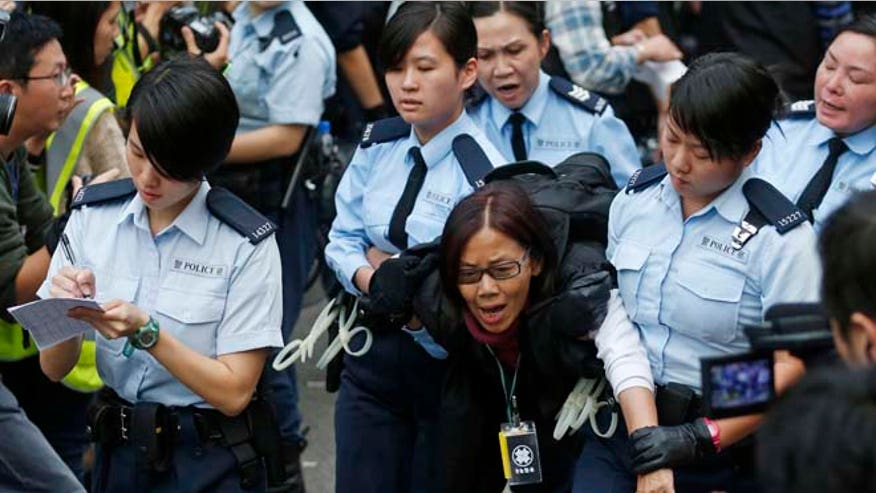
HONG KONG – Hong Kong authorities cleared away the last barricades and tents of a 2 1/2-month protest movement Thursday but the dozens of student leaders and other activists they took away vowed their fight for greater democracy wasn't over.
Hundreds of police officers carried out a methodical, peaceful operation to shut down the protest site that sprawled across a normally busy highway on the edge of the specially administered Chinese city's financial district.
The student-led demonstrators have been protesting Beijing's restrictions on the first election for Hong Kong's leader, though the movement's momentum has been fading in recent weeks.
Hundreds of remaining protesters heeded police warnings to leave the protest zone, but dozens of students, pro-democracy lawmakers and others, including middle-aged and elderly supporters, remained sitting on the street Thursday afternoon. They chanted "I want true democracy" and "We will be back" but offered no resistance as they were taken away one by one, many lifted off the ground.
Among those police took away were pro-democracy media mogul Jimmy Lai, Cantonese pop singer Denise Ho, veteran pro-democracy activist Martin Lee and pro-democracy legislators including Albert Ho.
Earlier Thursday, workers enforcing a court order removed barricades on the edge of the protest site before officers moved in and dismantled tents and obstructions from the rest of the site. They had warned protesters that they faced arrest if they did not leave.
"I think the spirit of the movement still lives, but the idea of occupying streets is over," said student Andrew Chan, 20, as he left the site. "We can't even get a big crowd to come out today to fight the police clearing the site."
Tents and canopies that had housed water and other supplies for the protesters lay in heaps among discarded newspapers, flip-flops, cardboard boxes and umbrellas -- which became a symbol of the protest movement after students used them to deflect police pepper spray.
One of the student leaders, Alex Chow, had rallied the crowds as the police approached, saying their fight was not over and they would find other ways to press forward in the days to come.
"People will come back again, they will come back with stronger force," he said.
The protesters reject Beijing's restrictions on the first election for the city's top leader, scheduled for 2017, but have failed to win any concessions from Hong Kong's government.
The sprawling encampment in Hong Kong's Admiralty section, on the edge of the financial district, has been the focal point for the protesters, who have occupied the site for 75 days.
In addition to hundreds of journalists at the scene, a group of about 30 academics was monitoring the police operation, as were the Independent Police Complaints Council and human rights groups.
On Sept. 28 police fired dozens of tear gas rounds at thousands of protesters gathering in the area angry over the prolonged detention of student leaders. The move infuriated protesters and the wider public and kick-started the student-led protest movement, which came to include two other protest sites in Hong Kong.
Police say 655 people have been arrested over the past 2 1/2 months, and that 129 officers were injured. They have given no overall injury toll.
A separate court order led to the clearing of the Mong Kok protest site in late November. That operation and ensuing nighttime clashes in the gritty neighborhood's surrounding streets resulted in about 160 arrests.
On the eve of Thursday's action to clear the Admiralty area, thousands of protesters and supporters streamed into the site for one last night of the "Umbrella Movement."
Two student groups that played key roles in organizing the protests had called for supporters to stay until the last moment, but not to resist authorities.
"If the government wants to use police to clear the site, don't forget, the clearance can't resolve political conflicts, it can't resolve society's dilemma," said Joshua Wong, the 18-year-old head of the Scholarism group and the pro-democracy movement's most prominent leader.

No comments :
Post a Comment